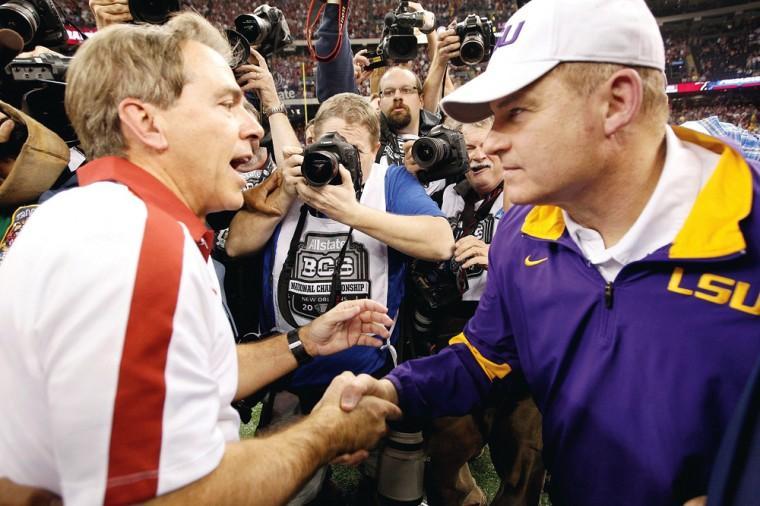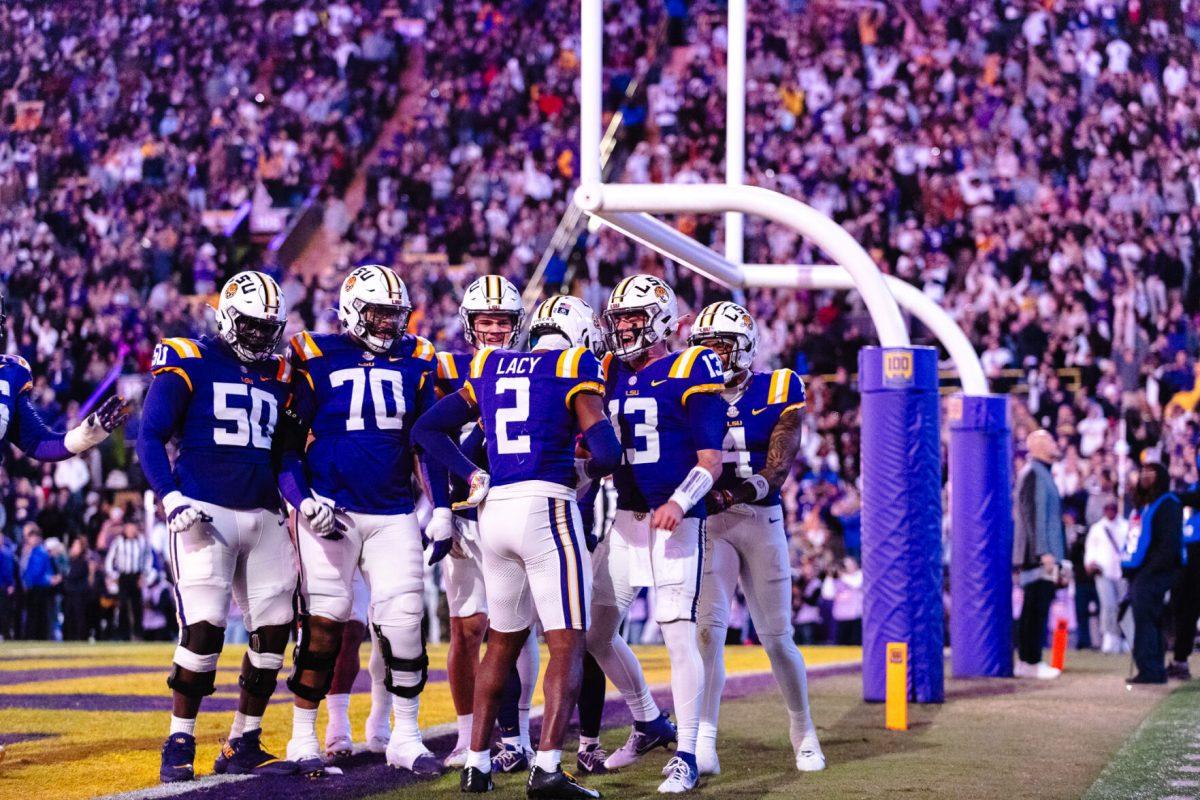It is no secret that Nick Saban laid the foundation for the renaissance the LSU Football program has seen in the 21st century, but it can also be said that he has been a major part of the downfall of his two successors.
Les Miles’ record was 114-34 when he was fired from LSU just four games into the 2016 season. A record that most coaches and fanbases can only dream of witnessing under a single tenure, but when the decision to fire Miles was made, few complained. You can make a strong argument that the downfall of Miles at LSU came at least partly at the hands of Saban’s success.
Miles was Saban’s immediate successor, and for the first three years of Miles’ stay in Baton Rouge, it seemed like LSU had struck gold with another coach. Miles and LSU went 34-6 during this span which was capped off with a National Championship at the end of the 2007 season. The other major event that coincided with LSU winning it all in 2007, however, was Saban’s return to the SEC.
Saban was hired as Alabama’s head coach prior to the 2007 season after a short two-year stint in the NFL with the Miami Dolphins. After a 7-6 finish in his first season, Saban and Alabama have since dominated the SEC and college football during his tenure. Saban has posted an overall record of 172-24 during his time at Alabama, and he is 11-4 against LSU.
Saban’s success both during his time at LSU and at Alabama completely changed the standard and expectation surrounding the LSU program. Saban’s consistent success for the Tide made competing for championships every year an expectation rather than just a goal. This is a tough ask for any coach, especially when the one man standing in the way of that year in and year out is Saban.
This is where down the stretch, the Miles era fell apart.
After beating Alabama in the “Game of the Century” in 2011, Miles was never able to get another win against Saban. His tenure would end with five straight losses against the Crimson Tide, a record that seemed to be the driving force in the case to move on from Miles.
The end of the Miles era led to the start of the Ed Orgeron era which, like many coaching changes, brought some hope to the eager fanbase. For the first three years, however, the results against Alabama stayed the same. The program just didn’t feel like it was on the same level as Alabama anymore, and that was certainly reflected in the matchups between the two teams.
Then, three years into Orgeron’s tenure in 2019, it seemed like everything changed.
For just the third time during Saban’s tenure at Alabama, LSU came into the game undefeated, and behind legendary performances from Joe Burrow and Clyde Edwards-Helaire, LSU defeated Alabama for the first time in eight years. LSU would go on to win the national championship that season and it felt like the program was finally back where it was supposed to be.
Then 2020 happened, and suddenly it felt like LSU was right back to where it was towards the end of the Miles era. Just one year removed from Orgeron’s infamous “Roll tide what?” speech, LSU lost at home to Alabama 55-17 in what was one of the program’s lowest points in recent memory.
Not even a year after from that embarrassment, LSU announced that they would be moving on from Orgeron at the end of the 2021 season. Two years after reaching the pinnacle of college football, LSU is looking for another new coach, and just like with Miles, few fans have complaints.
The downfall of Orgeron was much quicker than that of Miles, but it followed a similar path. Massive success followed by — in Orgeron’s case — mediocrity at best in the following seasons.
In the aftermath of this decision, two things seemed to become clear regarding LSU Football in the last 20 years. Saban’s success at LSU created an environment where any coach can come in and have some success, but whoever is the coach at LSU will be held to the nearly impossible standard that Saban has created at Alabama.
The difference between Saban’s Alabama teams and any other team in the country is that there never seems to be a rebuilding period. After every national championship comes to a mass exodus of players to the NFL, but there is never a drop off. For LSU that happened after each of its last two national championships and resulted in an 8-5 finish in 2008 and a 5-5 finish in 2020.
This is something to be expected from a team that lost as much as LSU lost in these years, but when the standard is that of Saban’s success it is not acceptable. After finishing 5-5 in 2020, questions were raised about Orgeron’s job security and after a 3-3 start the next season, the plug was pulled. The same questions were raised about Miles after 2008 and if it weren’t for a nationwide higher education crisis in 2009, Miles would’ve suffered the same fate.
It’s no secret that Saban has had a huge impact on the sport as a whole during his career, but it flies under the radar just how much of a positive and negative effect he has had on LSU and every coach that takes that job.
Column: How Nick Saban made one of easiest and hardest head coaching jobs
November 2, 2021
Alabama head coach Nick Saban and LSU head coach Les Miles greet each other after the BCS National Championship game in New Orleans in January. Saban seems pleased that a four-team playoff won’€™t be limited to conference champions. (AP photo)






